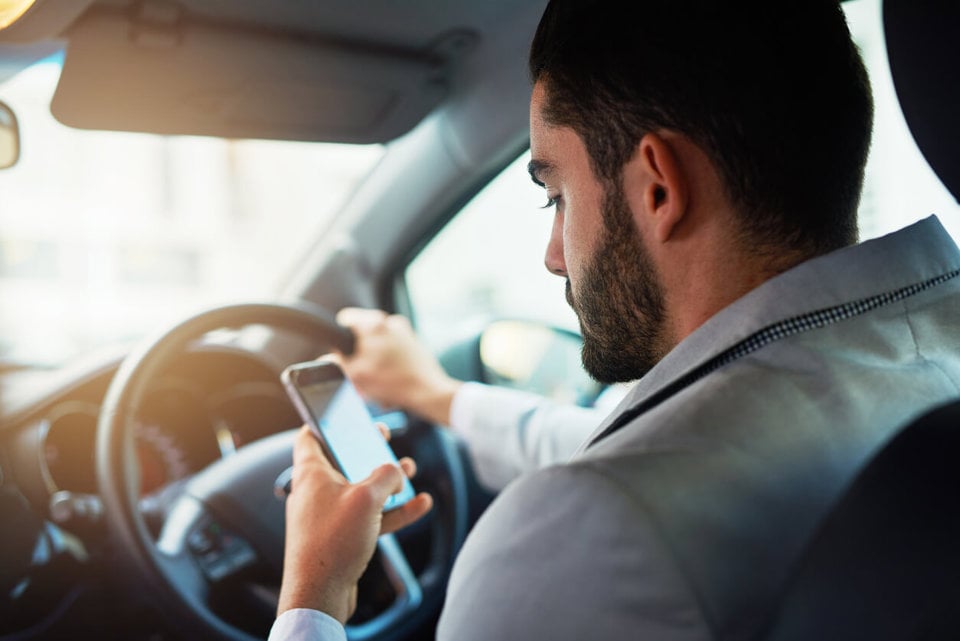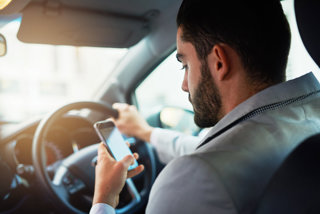Fleets are being warned that it is now illegal to use a hand-held mobile phone while driving under virtually any circumstance as new rules come into force today (Friday, March 25).
Drivers will be breaking the law if they use a handheld mobile phone behind the wheel for any use, including to take photos or videos, scroll through playlists or play games.
Anyone caught using their hand-held device while driving could face a fine of up to £1,000 as well as six points on their licence or a full driving ban.
Transport secretary Grant Shapps said: “I will do everything in my power to keep road-users safe, which is why I am taking a zero-tolerance approach to those who decide to risk lives by using their phone behind the wheel.
“I’m ensuring anyone who chooses to break this vital law can face punishment for doing so, and we’ll continue our efforts to ensure our roads remain among the safest in the world.”
Motorists ignorant about law change
Fleets are being urged to make their drivers aware of new rules for using a mobile phone while driving after exclusive research suggested a high-level of ignorance.
Two out of five respondents to a Fleet News poll (42%) said they were not aware the Government was updating the legislation, while a further one-in-20 (5%), who knew the law was being tightened, thought it was not happening for six months or more (Read more in the latest edition of Fleet News).
It mirrors a separate poll from RAC research, which shows four-in-10 (43%) aren’t aware of the changes being introduced and just 2% believe it will be very effective in improving driver behaviour.
While most of the 2,000 drivers surveyed by the RAC (75%) are fully supportive of the change in the law, many are sceptical as to how effective it will be in getting offending drivers to change their behaviour and make the roads safer.
Just 2% of drivers said they thought it will be ‘very effective’, with 49% thinking it would be ‘partly effective’ and a similar proportion – 45% – saying it won’t be effective.
Of those who have concerns the roads won’t be made safer by the changes that come in today, 86% say that it’s because some drivers will always persist in using a phone illegally regardless of the law, while seven-in-10 (70%) say the problem is drivers don’t feel they’re likely to get caught in the first place.
Nearly three-in-10 (28%) fear not enough will be done to let drivers know about the changes.
When it comes to what drivers think needs to be done to reduce the number of people using a handheld phone illegally at the wheel, drivers are split.
Almost equal proportions believe that more visible police enforcement (23%), a high-profile advertising campaign (24%) and even tougher laws (26%) – such as the threat of a driver losing their licence altogether if caught.
A fifth, meanwhile, (20%) would like to see cameras used to catch drivers acting illegally.
RAC spokesperson Rod Dennis: “While we welcome today’s law change and very much hope it will make a difference, it’s arguable that it will only be truly effective if it’s rigorously enforced.
“If some drivers still don’t feel they’re likely to be caught, then simply making the law tougher isn’t going to have the desired effect of making our roads safer.
“That explains why such a tiny proportion of drivers – just 2% - think the new changes will be very effective in changing behaviour.
“The dial really needs to be turned up when it comes to enforcement, and that means police forces having the resources and technology they need to more easily catch those drivers that continue to flout the law.
“Cameras that can automatically detect handheld phone use exist and are in use in other countries, so we think it’s high time the UK Government evaluated this technology with a view to allowing police forces to deploy it at the earliest opportunity.”
Campaign to remind drivers of changes
The Government’s Think! team is launching an £800,000 awareness campaign to remind drivers not to use a handheld phone at the wheel and the penalties of choosing to ignore this new law.
The campaign will run across video on demand, online video, social media channels and radio in England and Wales until the end of April.
Edmund King, AA president, said: “This is a much-needed toughening of the rules to help make our roads safer.
“Those that believe that they can still play with their phone because it’s in a cradle must think again – they leave themselves open to prosecution for either careless or dangerous driving.
“The best thing to do is to convert your glovebox into a phone box. We all need to keep our hands on the wheel and our eyes on the road.”
Drivers are able to make contactless payments, for example at drive-thrus, so long as their vehicle is stationary.
They can also still use a device ‘hands-free’ while driving if it’s secured in a cradle, allowing motorists to use their phone as a sat-nav.
They must, however, always take responsibility for their driving and can be charged with an offence if the police find them not to be in proper control of their vehicle.
Updates to the law follow a public consultation that found 81% of respondents supported such proposals to make it easier for culprits to be prosecuted.
The law previously only applied to so-called ‘interactive communication’ such as making a call, as it was written before mobile phones could be used for more complicated tasks such as taking videos.
Previously those caught using their mobiles at the wheel have in some cases been able to escape conviction through claiming that they weren’t using them for ‘interactive communication’.
The update to the law ensures nobody will be able to use the loophole to escape conviction, says the Government.
Jason Wakeford, head of campaigns for Brake, the road safety charity, said: “Until now, the law has simply not kept pace with the way in which we use smartphones, so the closing of this dangerous loophole is very welcome.
“Figures show that using a mobile phone at the wheel makes reaction times even slower than when driving under the influence of alcohol, so it’s vital that we always give the road our full attention.
“Brake supports the families of road crash victims, including those who have had lives torn apart because someone did not pay proper attention to their driving. The temptation of looking at a phone can never be worth someone’s life.”























Login to comment
Comments
No comments have been made yet.